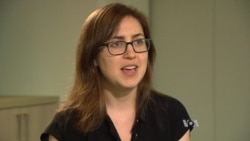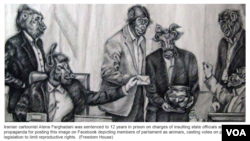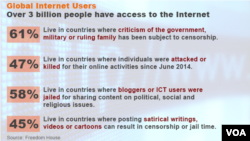When it comes to protecting freedom of expression online, the news is not good.
For the fifth straight year in a row, the World Wide Web became less free for millions of people, as governments around the world continued restricting online expression, censoring websites and cracking down on a variety of tools designed to protect user privacy.
That’s the conclusion of a new report, “Freedom on the Net 2015,” released Wednesday by Freedom House, a nonprofit promoting democracy and free expression globally. It’s the sixth annual survey of 65 governments and their policies regarding censoring online content, electronic surveillance, and how they may punish citizens whose online activities they disapprove of.
“Internet freedom on a global scale is continuing to decline,” said Laura Reed, a research analyst for the Freedom on the Net project. “This is a decline we’ve seen over the past five years, but now we’re seeing a lot more of these declines coming from new laws being passed.”
WATCH: Laura Reed describes growing threat to Internet users
Among the greatest threats to online freedom, Reed told VOA, are an escalation in Internet user intimidation and arrest, the growing number of nations conducting surveillance – whether publicly acknowledged or not – and new efforts to remove, rather than merely block, offensive content.
Freedom on the Net
Freedom on the Net
47% live in countries where corruption allegations against top government or business figures can be repressed or punished
34% live in countries where LGBTI voices have been silenced or where access to resources has been limited by authorities
38% live in countries where popular social media or messaging apps were blocked in the past year.
34% live under governments which disconnected internet or mobile phone access in 2014-2015, often for political reasons
“The most surprising shift was from blocking to the removal of content,” Reed said. “Now that we’re seeing governments target content at the source, it’s really concerning; both in the sense that that content is removed forever, and also the pressure they bring with that – on social media companies, on individuals.”
Internet population
The 65 nations that are part of the survey account for approximately 88 percent of the world’s Internet user population. More than 40 percent of all users live in just three countries: China, the United States and India, with only the U.S. being categorized as “free” among those three.
Researchers found that in 2015, Internet freedoms declined in 32 of the 65 nations surveyed, with many of those nations – including China, Russia, Turkey and Egypt – home to sizable populations of Internet users.
China was ranked 2015’s worst abuser of Internet freedom, as Chinese officials continued to squeeze the Web – for example, cracking down on nearly 200 people for their online activities and blocking access to a number of VPNs, or virtual private networks, used to shield identity and evade firewalls.
Syria and Iran were rated the second- and third-worst offenders of online freedoms, respectively. As in years past, the governments of Saudi Arabia, Vietnam and Zimbabwe were rated among the least free for their suppression of free speech.
The ongoing conflict between Russia and Ukraine also pushed those nations’ rankings down for the second consecutive year, as both harshly punished critics while some Web users in Eastern Ukraine were physically threatened by paramilitary groups sympathetic to Moscow.
Fifteen of the 65 nations surveyed managed some improvements, however.
Among them was Cuba, which, following the normalization of diplomatic relations with the U.S., cut the cost of Internet access in half and showed greater tolerance toward online criticism directed by Cubans at Havana.
In a disturbing trend, Freedom House researchers tracked what they call “the privatization of censorship” as a new tactic increasingly being used by repressive governments.
“Instead of blocking content, governments are seeking the removal of that content – and that often requires the companies that host that content to remove it themselves,” Reed said.
“So we’re seeing a move [to shift] censorship to the private sector, in the sense that these private companies are being pressured by governments to remove content online forever,” she said.
For example, the report cites the growing use of the secure https protocol, which encrypts data transmissions. With https, governments are no longer able to block individual Facebook pages, leaving the only option for blocking objectionable content a complete block of the entire Facebook platform.
“That’s something governments really don’t want to do, as it attracts a lot of international attention," Reed said. “Rather than taking that drastic step, [governments] will issue requests to the social media company or content host, asking them to remove the content that’s deemed in conflict with local laws.”
Of those nations surveyed, 40 of 65 – fully 61 percent – imprisoned users for expressing political or social comments online; that’s up from 38 nations last year.
Thailand was one of the worst offenders, notably for its extremely strict lese majeste laws that forbid insults to the monarchy.
The expansion of the Islamic State group throughout Syria and Iraq, and its brutal use of social media to track and punish opponents, as well as Iran’s continuing repression of online dissidents and Saudi Arabia’s sentencing of some online comments, to flogging and even death, helped push the Middle East region into the least free online region of the globe, followed closely by Asia and Sub-Saharan Africa.
Another trend, Reed said, is that while users have become more adept at evading national firewalls and website blocks, governments have responded by increasingly restricting the use of encryption technologies.
China recently passed a law requiring ISPs and telecom providers to install “back door access” to encrypted devices and traffic – a measure that U.S. FBI director James Comey has also called for in the United States.
The report authors note that, while online freedoms continued to erode in 2015, activism remained a prime driver for expanding Internet freedoms and expression, such as the landmark European Court of Justice ruling on the “right to be forgotten” case, originally brought by digital activists.
“Laws and court decisions are restricting the online sphere, but also this year one of the trends that we noticed was that a lot of advances in Internet freedoms – the ‘wins’ for us – were coming from the judicial sphere,” Freedom House's Reed said. “This push from civil society to get laws passed, that’s where we’re seeing these battles being waged.”
The report concludes by saying that similar legal victories "could help ensure that the fight for a free and open Internet ultimately succeeds, despite the setbacks that have affected so much of the world in recent years.”










